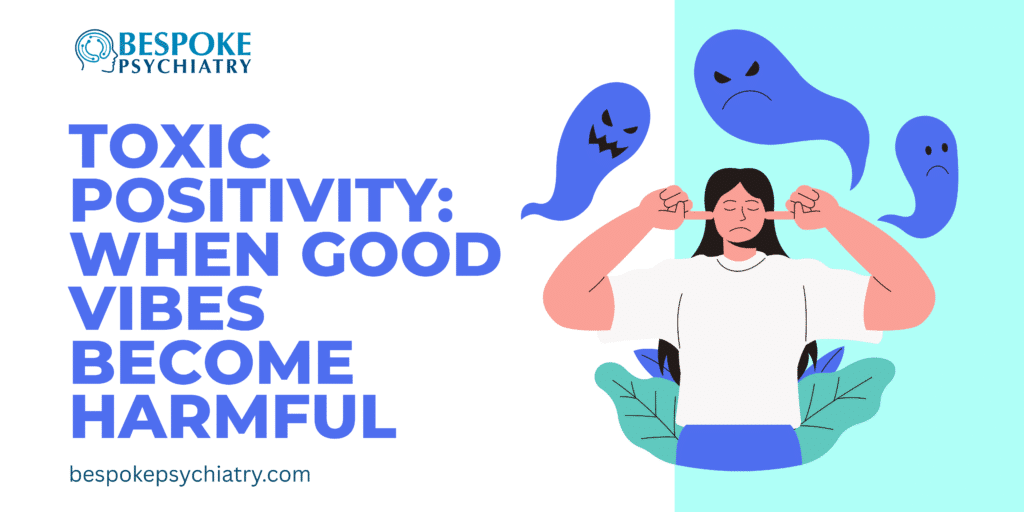
In today’s mental health landscape, one term gaining increased attention is toxic positivity—the overgeneralization of a happy, optimistic state across all situations. While staying positive is often seen as a mental strength, ignoring the reality of difficult emotions can be psychologically damaging. At Bespoke Psychiatry, we believe in validating the full spectrum of human emotion and helping individuals break unhealthy emotional patterns rooted in avoidance and shame.
What Is Toxic Positivity?
Toxic positivity is the belief that one should always maintain a positive mindset, no matter how difficult or painful the circumstances. It sounds like:
- “Just think happy thoughts.”
- “Everything happens for a reason.”
- “At least it’s not worse.”
- “Don’t be so negative.”
While these phrases may be well-intentioned, they often invalidate emotional pain, discouraging people from processing real feelings like grief, anger, or fear. Over time, this kind of emotional suppression can contribute to increased anxiety, depression, and emotional isolation.
Is Toxic Positivity a Coping Mechanism?
Yes—and like many coping strategies, it often starts with the goal of emotional survival. For many people, toxic positivity is a learned response:
- From childhood environments that discouraged vulnerability
- From cultural or familial beliefs that equate emotions with weakness
- As a way to cope with trauma, loss, or uncertainty
Suppressing painful emotions may feel safer than confronting them. But in the long term, disconnection from authentic feelings can lead to emotional numbing, unresolved trauma, and difficulty in relationships.
The Mental Health Consequences
Toxic positivity is not just a personal habit—it’s often reinforced by social media, workplace culture, or societal norms. But research shows that:
- Emotional suppression increases physiological stress and can dysregulate the nervous system.
- Forced positivity may contribute to feelings of shame, especially when individuals feel guilty for not “being happy.”
- It can prevent people from seeking mental health support, leading to untreated anxiety, depression, or burnout.
Ignoring emotional distress doesn’t make it disappear—it buries it deeper, where it can manifest as physical symptoms, chronic stress, or unhealthy coping behaviors.
What Do We Actually Need?
Breaking the cycle of toxic positivity starts with one word: validation.
Instead of trying to fix or erase emotions, we must honor them. Healthy emotional processing includes:
- Naming your feelings: “I feel overwhelmed right now.”
- Allowing discomfort: Pain is part of the human experience.
- Practicing radical self-compassion: You don’t need to be “okay” all the time to be worthy of support.
- Seeking connection: Talking to a therapist or trusted person can reduce isolation and help reframe patterns of emotional avoidance.
It also means retraining your inner voice to allow complexity: You can be grateful and grieving. You can be hopeful and anxious. Emotional experiences are not binary.
Breaking Free from Performative Positivity
At Bespoke Psychiatry, we believe real mental wellness comes from authenticity, not performance. That means creating a safe space where all feelings—especially the hard ones—are allowed and explored. Our approach supports individuals in learning emotion regulation, building resilience, and challenging toxic emotional narratives rooted in perfectionism and avoidance.
Reach Out for Support
If you’ve been struggling with emotional suppression, chronic stress, or feel like you always have to “stay strong,” you are not alone—and you don’t have to carry it alone either. Click HERE to become a new patient, or visit Bespoke Psychiatry’s website.
Let’s talk.
Our team at Bespoke Psychiatry offers compassionate, evidence-based care tailored to your needs. Whether you’re facing anxiety, burnout, or simply seeking more authentic emotional connection, we’re here to help.
Contact Bespoke Psychiatry to schedule a consultation and take the first step toward healing through truth.



